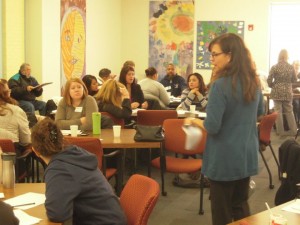Â
The Oxford English Dictionary’s most recent revision was published on March 24 with 19,000 new entries, among which were the initialisms OMG, LOL, IMHO, BFF, and more. Most people probably associate these initialisms as a form of digital communication for a younger generation in the last 10-20 years, says the OED. But research found that the first use of OMG in the written language was in a personal letter written in 1917.
With the increased amount of devices and number of children using them at younger ages has come the issue of students bringing text language in the classroom. Younger generations of students are being raised on the fast and efficient use of initialisms and abbreviations to relay messages that arrive and get responded to as fast as speech. Some teachers deal with this “problem” by banning the use of initialisms in their classroom while others invite initialisms in their lessons to teach about the difference between formal and informal writing, audiences, and appropriateness of a message.
Share the inclusion of initialisms in the OED with your class to inspire a discussion on elements that influence the English language. Get the discussion going with the following questions:
- What is the definition of a “word”?
- Do you think initialisms should be included in the dictionary?
- How does popular culture influence the future?
- Do you predict these initialisms will be around for the next 10, 20, 30 years?
Do you allow the use of initialisms or other forms of “textlish” in your classroom? Why or why not? Share your experience with the English language and a new generation in the comment box below.
(Resources: New Initialisms in the OED [http://www.oed.com/public/latest/latest-update/#new])











![By Drm310 (Own work) [CC-BY-SA-3.0 (www.creativecommons.org/licenses/by-sa/3.0) or GFDL (www.gnu.org/copyleft/fdl.html)], via Wikimedia Commons](http://upload.wikimedia.org/wikipedia/commons/e/e8/UofS_Lily.jpg)





